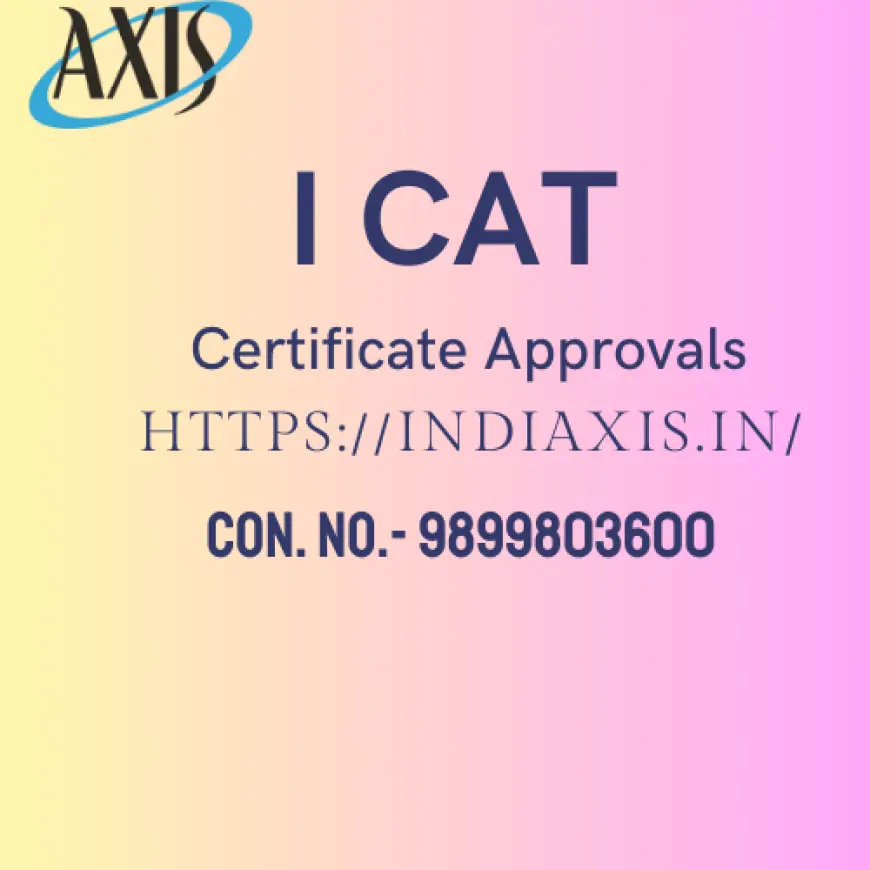Icat Certificate Approvals
Get ICAT Certificate Approvals for vehicles, components, and EVs to meet safety, emission, and regulatory standards. Ensure compliance, gain market access, and enhance credibility with ICAT certification. Learn the process, benefits, and how to apply today!

The automotive industry is one of the most regulated industries worldwide, requiring strict adherence to safety, environmental, and performance standards. Among the various certification agencies, the International Centre for Automotive Technology (ICAT) plays a crucial role in ensuring vehicles and automotive components meet regulatory compliance. "ICAT Certificate Approvals" is a critical process that manufacturers must undergo to launch their products in the market. This article explores the significance of ICAT approvals, their process, benefits, and industry impact.
Understanding ICAT
The International Centre for Automotive Technology (ICAT) is a premier testing and certification agency in India, established under the aegis of the National Automotive Testing and R&D Infrastructure Project (NATRiP). It provides testing, validation, design, and certification services for the automotive industry. ICAT Certificate Approvals are necessary for manufacturers to ensure that their vehicles, components, and accessories comply with national and international standards.
Importance of ICAT Certificate Approvals
ICAT certification is crucial for several reasons:
-
Regulatory Compliance – ICAT approvals ensure compliance with the Central Motor Vehicles Rules (CMVR) and other international standards.
-
Market Access – Many markets require certification before products can be sold.
-
Consumer Trust – ICAT-certified products assure customers of quality and safety.
-
Environmental Responsibility – Ensuring that automotive products meet emission standards.
-
Technological Validation – It validates the innovation and performance of automotive components.
ICAT Certification Process
The process of obtaining ICAT Certificate Approvals is systematic and involves several stages:
1. Application Submission
Manufacturers must submit an application detailing the product and its specifications. This includes technical data, design drawings, and intended applications.
2. Preliminary Assessment
ICAT experts conduct an initial review of the application to determine the testing and evaluation criteria.
3. Testing and Evaluation
The product undergoes rigorous testing at ICAT’s state-of-the-art laboratories. Tests may include:
-
Safety assessments
-
Emission and environmental impact analysis
-
Performance and durability tests
-
Electromagnetic compatibility tests
4. Documentation Review
Alongside physical testing, ICAT reviews all supporting documentation to ensure compliance with regulatory frameworks.
5. Certification Granting
If the product meets all requirements, ICAT issues the certification, allowing the manufacturer to market their product.
6. Post-Certification Compliance
Manufacturers must ensure continued compliance through periodic audits and re-certifications.
Categories of ICAT Certificate Approvals
ICAT provides approvals for various automotive sectors:
1. Vehicle Type Approval
ICAT certifies entire vehicles to ensure they meet safety and emission standards.
2. Component and System Certification
Automotive components, including brakes, engines, lighting systems, and batteries, require ICAT approval.
3. Electromagnetic Compatibility (EMC) Certification
This certification ensures that vehicles and components comply with electromagnetic interference regulations.
4. Electric Vehicle and Battery Certification
With the rise of EVs, ICAT plays a crucial role in certifying electric powertrains and batteries.
5. Noise and Vibration Testing
ICAT assesses noise levels to ensure compliance with noise pollution regulations.
Benefits of ICAT Certificate Approvals
Manufacturers gain several advantages from ICAT certification:
-
Legal Compliance – Ensures compliance with national and international laws.
-
Enhanced Credibility – Certified products are more trusted by consumers and regulatory bodies.
-
Better Market Opportunities – Many regions require ICAT certification for market entry.
-
Improved Product Quality – The rigorous testing process helps refine and improve products.
-
Competitive Advantage – ICAT-certified products have a competitive edge over uncertified counterparts.
Challenges in Obtaining ICAT Certification
While ICAT Certificate Approvals provide numerous benefits, the process also presents challenges:
-
Time-Consuming Process – Testing and documentation reviews can take months.
-
High Costs – Certification fees and testing costs can be significant.
-
Strict Compliance Requirements – Ensuring every product detail meets the required standard is challenging.
-
Continuous Updates – Regulations and standards are frequently updated, requiring continuous compliance efforts.
ICAT Certification vs. Other Certification Bodies
ICAT is one of several global certification agencies. Some others include:
-
Automotive Research Association of India (ARAI) – Another major Indian automotive certification body.
-
Bureau of Indian Standards (BIS) – Certifies various automotive and industrial products.
-
European Union’s ECE Certification – Required for vehicles entering the European market.
-
United States’ DOT and FMVSS Certifications – Necessary for North American markets.
ICAT certification is particularly relevant for manufacturers targeting the Indian market, while other certifications may be required for international expansion.
Future of ICAT Certification
The automotive industry is evolving rapidly, with advancements in electric mobility, autonomous driving, and connected technologies. ICAT is adapting to these changes by expanding its testing capabilities and upgrading its infrastructure. The future of ICAT Certificate Approvals will likely see:
-
Enhanced EV Testing Facilities – More focus on battery safety and performance.
-
Integration of AI and Automation – Faster and more accurate testing methods.
-
Global Collaboration – Aligning ICAT standards with international regulatory bodies.
-
Sustainability Measures – More stringent emission and environmental impact standards.
Conclusion
ICAT Certificate Approvals play a vital role in ensuring automotive products meet safety, environmental, and performance standards. For manufacturers, obtaining ICAT certification is an essential step toward legal compliance, market access, and consumer trust. Despite challenges such as cost and time requirements, the benefits of ICAT certification far outweigh the drawbacks. As the automotive industry progresses towards more sustainable and technologically advanced solutions, ICAT’s role in certification and regulation will only become more significant.












